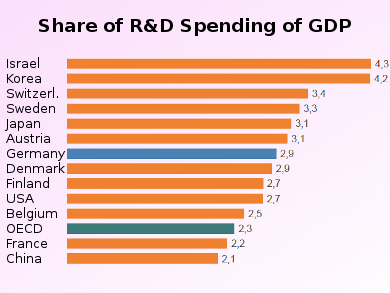In 2018, the R&D spending of the German chemical-pharmaceutical industry will reach the 11-billion-euro mark for the first time, according to the forecast of Thomas Wessel, chairman of the VCI committee for research, science, and education. In 2017, the R&D budget went up to the then-record total of 10.8 billion euros. That was an increase of 3 % over the previous year 2016. Thus, there was a rise in the industry’s funds for research and development for seven consecutive years.
In a comparison of industries, the chemical-pharmaceutical industry has the strongest innovation orientation. 63 % of all chemical and pharmaceutical companies are engaged in research. This puts the sector above the average of German industry as a whole (28 %). The chemical industry dedicates over 5 % of sales to research annually. The R&D intensity is only higher in vehicle construction and in the electrical industry.
Even though there are many strengths in R&D, Wessel is concerned about the international innovation pressure: Countries like the USA, China, or other Asian nations make huge investments in research and provide a favorable framework for innovation. Thus, they are gaining competitive advantages. Wessel calls upon the German government “to take a courageous route for modernization, as this is the only option for Germany to hold its own in the global race for innovation—competing with research superpowers such as the USA, China, or South Korea.”
Wessel sees fiscal incentives for R&D as a central instrument for improving the quality of Germany as an innovation location. According to the chairman, such incentives are crucial for research investments by the overall economy to rise to 3.5 %. In this respect, Germany currently is ranked only seventh internationally. Almost all OECD countries use the mentioned incentives to drive forward research.
Wessel calls for more openness for new technologies so that innovations can really thrive in Germany. In this context, Wessel regrets the recent judgment of the European Court of Justice on genome editing which, in his opinion, is not based on existing scientific facts but blocks the potential of CRISPR/Cas and comparable methods.
- German chemical industry association (VCI), Frankfurt am Main, Germany




